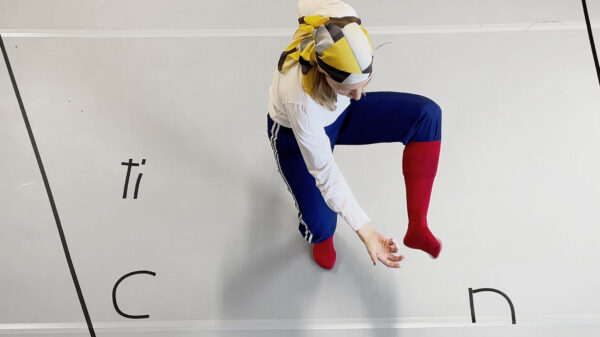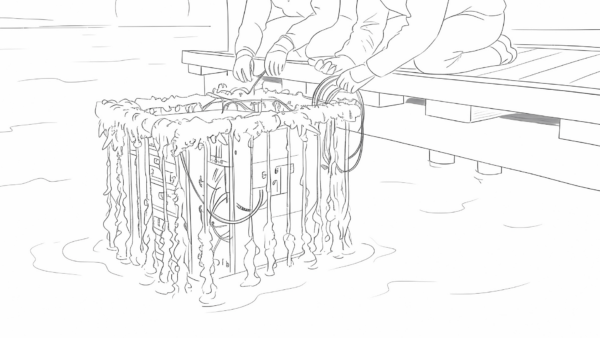

Next Space Rebels: a race to internet freedom
DIY communities, gaming, art, hobby rocket builders, hacker communities and a dose of critical space activism. These are the ingredients of Floris Kaayk’s speculative storytelling project Next Space Rebels. The game stars the fictional hacker group of the same name. It calls on the global community to design, build and launch their own rockets. This will allow them to secure a spot in orbit with their own satellites and establish a more independent internet. ‘A rocket hobbyist becomes an experienced space activist who must critically question who the Internet and space really belong to.’
For Floris Kaayk, this is his first extensive speculative art project that grew to become a commercial product. ‘I have a keen interest in the tinkering and DIY aspect of amateur rocket builders and am fascinated by the desire of ordinary citizens to travel to another planet just like wealthy big business and governments. I also find the motivations of the hacker community interesting; they want to secure a spot in orbit without those big companies and with their own resources,’ says the digital designer, storyteller, director and filmmaker.

experiment with nostalgia
The game Next Space Rebels revolves around creating a new sanctuary that, like in the 1990s when the World Wide Web was the Wild West, was not yet controlled by the big companies such as Google and Facebook. In that sense, it’s a nostalgic-looking experimental game within a traditional world and a forward-thinking game; Kaayk mixes many elements into a collage, tells an intelligent, substantive and layered story, and offers players multiple – critical – choices.

race to internet freedom
The main character owns the internet company Star Connect. ‘He is deliberately an unsympathetic, activist, anti-capitalist people’s agitator. A kind of extreme left-wing Thierry Baudet,’ outlines Kaayk, ‘with a dual agenda, who sells his soul to the devil.’ Players can support or criticize him, which is why the game has three endings because not a single scenario is favourable. For while players may help the fictional characters in their race to internet freedom, the question, of course, is whether it is possible to establish a free internet.
‘Whoever owns the satellites, like NASA and Elon Musk, has power over space and over the future of the internet,’ Kaayk knows. ‘Musk could put a shell around the Earth with 15,000 satellites without the space police intervening, because there are no regulations above 100 kilometres. This is worrisome and dangerous. In the process, free spaces on the internet, such as the Dark Web, are being confiscated by cyber criminals, and 4Chan by the far right.’


new terrain
With this wide-reaching project, Kaayk is treading new ground, although the game fits in seamlessly with his previous successful projects. To realize the project, he gained knowledge from the European Space Agency, but found most of the information online. Kaayk, as the director with technical knowledge, put together a small team with a large network: Paulien Dresscher, curator of the digital culture programme at the Netherlands Film Festival and Into The Great Wide Open, producer Siuli Ko, two interns from St Joost academy, one of whom, creative gamer Tijmen Meijer, now works permanently at Kaayk’s studio, the experienced programmer Maarten Brouwer who can set up the complex structure and keep it running in a stable way, and a user-interface developer.
additional funding
The team also looked for additional funding. This was found at the Global Developers Conference (GDC) in the US, where they were able to bring the game to the attention of the network of game publishers. San Francisco-based Humble Games partnered with them and funded the third phase of the project. ‘Without the Fund’s starting grant, we would never have been able to do this deal, which allowed an experimental art project to grow into a commercial one,’ says Kaayk. This in turn led to a deal that everyone wishes they had: Microsoft took a copy of Next Space Rebels and is offering it through its own subscription service Game Pass.


positive critics
In advance, Kaayk had set a number of practical and content-related goals. One is to hold the gaming audience’s attention for a long time. It has been beyond successful. ‘I'm proud that there are gamers who spend 60 to 100 hours in my storytelling world,’ he says. ‘That's a compliment, because gamers are quite critical people.’ Statistics from online communities such as Steam’s forum additionally showed that 85% of reviews are positive. Many streamers and content creators played the game live on YouTube and Twitch, and the trailer was live-streamed during the main programme at E3, the most influential gaming expo in Los Angeles. The game also had its live premiere: during the Netherlands Film Festival. ‘It leaves me wanting more. My goal is for my new game to be a world hit,’ Kaayk says confidently.
This project was supported through the Digital Culture Grant Scheme in 2017 with a starting grant; the follow-up to the project was supported in 2019.
Text: Viveka van de Vliet







